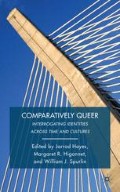Abstract
At stake here is a dialogue between two minoritized historiographies—one in South Asian studies and the other in queer-sexuality studies—and their shared preoccupation with the responsibility of historical emergence and recognition. To attempt such a dialogue, this chapter moves away from the conventional (and often reactionary) segregation of the two field formations as oppositional or discrete. Central to the argument is an understanding of area studies as constitutive of the histories of sexuality and vice versa.1 My goal is not merely to narrate the analytical convergences between the two field formations; rather I am interested more in what I will call the “comparative imaginaries” that animate such a conversation. By “comparative imaginaries,” I mean to gesture to the incursions of temporality, to the “politics of time” that emerge in our desire for knowledge and in our ethical stances toward otherness.2
Access this chapter
Tax calculation will be finalised at checkout
Purchases are for personal use only
Preview
Unable to display preview. Download preview PDF.
Works Cited
Anderson, Benedict. The Spectre of Comparisons: Nationalism, Southeast Asia and the World. London: Verso, 1998.
Arondekar, Anjali. “Without a Trace: Sexuality and the Colonial Archive.” Journal of the History of Sexuality 14. 1–2 (2005): 10–27.
Banerjee, Prathama. Politics of Time: “Primitives” and History-Writing in Colonial Society. New Delhi: Oxford UP, 2006.
Bayly, C. A. The Local Roots of Indian Politics: Allahabad 1880–1920. Oxford: Clarendon, 1975.
Boellstorff, Tom, David A. B. Murray, and Kathryn Robinson. “East Indies/West Indies: Comparative Archipelagoes.” Anthropological Forum 16.3 (2006): 219–27.
Brass, Paul. Language, Religion and Politics in North India. New York: Cambridge UP, 1974.
Cheah, Pheng. “Grounds of Comparison.” Diacritics 29.4 (1999): 3–18.
Chevers, Norman. A Commentary on the Diseases of India. London, 1886.
——. A Manual of Medical Jurisprudence for India: Including the Outline of a History of Crime against the Person in India. Calcutta, 1870.
Chow, Rey. The Age of the World Target: Self-Referentiality in War, Theory, and Comparative Work. Durham: Duke UP, 2006.
Coopan, Vilashini. “Ruins of Empire: The National and Global Politics of America’s Return to Rome.” Postcolonial Studies and Beyond. Ed. Ania Loomba, Suvir Kaul, Matti Bunzl, Antoinette Burton, and Jed Esty. Durham: Duke UP, 2005. 81–100.
Fabian, Johannes. Time and the Other: How Anthropology Makes Its Object. New York: New P, 1983.
Fernandes, Jason Keith. “The Dilemma after the Decision: Stray Thoughts after Gay Liberation.” Tehelka 14 Aug. 2009. http://www.tehelka.com/story_main42.asp?filename=Ws220809The_Dilemma.asp. 1 June 2010.
Fernandez, Bina, ed. Hum Jinsi: A Resource Book on Lesbian, Gay & Bisexual Rights in India. Mumbai: India Centre for Human Rights and Law, 1999.
Freitag, Sandria B. Collective Action and Community: Public Arenas and the Emergence of Communalism in North India. Berkeley: U of California P, 1989.
Grewal, Inderpal, Akhil Gupta, and Aihwa Ong. “Introduction.” positions 7.3 (1999): 653–66.
Hacking, Ian. Historical Ontology. Cambridge: Harvard UP, 2002.
Joshi, Sanjay. Fractured Modernity: Making of a Middle Class in Colonial North India. New Delhi: Oxford UP, 2001.
Kapur, Ratna. Erotic Justice: Politics of Postcolonialism. New Delhi: Permanent Black, 2005.
Katyal, Sonia. “Exporting Identity.” Yale Journal of Law and Feminism 14 (2002): 97–176.
Kolsky, Elizabeth. “A Note on the Study of Indian Legal History.” Law and History Review 23.2 (2006): 703–6.
McClintock, Anne. Imperial Leather: Race, Gender and Sexuality in the Colonial Contest. New York: Routledge, 1995.
Menon, Nivedita. Recovering Subversion: Feminist Politics beyond the Law. Urbana: U of Illinois P, 2004.
Mirro v. Emperor. All India Reporter 34 (1947): 97.
Misra, Salil. A Narrative of Communal Politics: Uttar Pradesh, 1937–39. New Delhi: Sage, 2001.
Naz Foundation v. Govnt. of Delhi, Police Commissioner of Delhi, Delhi State. AIDS Control Society, Union of India, Civil Writ Petition. 2001.
Pandey, Gyandendra. The Ascendancy of the Congress in Uttar Pradesh 1926–34: A Study in Imperfect Mobilization. Delhi: Oxford UP, 1978.
Parker, Kunal. “The Historiography of Difference.” Law and History Review 23.2 (2006): 685–95.
Radhakrishnan, Radha. History, the Human, and the World Between. Durham: Duke UP, 2007.
Ranchhoddas, Ratanlal, and Dhirajlal Keshavlal Thakoree. The Indian Penal Code. 27th ed. Nagpur: Wadhwa, 1992.
Rawat, Ramnarayan S. “Making Claims for Power: A New Agenda in Dalit Politics of Uttar Pradesh, 1946–48.” Modern Asian Studies 37.3 (2003): 585–612.
Repeal of Section 377. <http://lobis.nic.in/dhc/APS/judgement/02-07-2009/APS02072009CW74552001.pdf>. 1 Aug. 2009.
Robertson, Stephen. “What’s Law Got to Do with It? Legal Records and Sexual Histories.” Journal ofthe History of Sexuality 14. 1–2 (2005): 161–85.
Sen, Amartya. “Amartya Sen’s Statement on the Need to Do Away with Section 377 of the Indian Penal Code.” The Hindustan Times 15 Sept. 2006. http://www.sacw.net/SexualityMinorities/ASen_377sept2006.html. 1 June 2010.
Spivak, Gayatri Chakravorty. A Critique of Postcolonial Reason: Towards a History of the Vanishing Present. Cambridge: Harvard UP, 1999.
——. Death of a Discipline. New York: Columbia UP, 2003.
Stoler, Ann Laura, ed. Haunted by Empire: Geographies of Intimacy in North American History. Durham: Duke UP, 2006.
Vanita, Ruth, ed. Queering India: Same-Sex Love and Eroticism in Indian Culture and Society. New York: Routledge, 2002.
Wilson, Ara. “Queering Asia.” Intersections: Gender, History and Culture in the Asian Context 14 (2006). <http://wwwsshe.murdoch.edu.au/intersections/issue14/wilson.html>.
Editor information
Copyright information
© 2010 Jarrod Hayes, Margaret R. Higonnet, and William J. Spurlin
About this chapter
Cite this chapter
Arondekar, A. (2010). Time’s Corpus. In: Hayes, J., Higonnet, M.R., Spurlin, W.J. (eds) Comparatively Queer. Palgrave Macmillan, New York. https://doi.org/10.1057/9780230113442_6
Download citation
DOI: https://doi.org/10.1057/9780230113442_6
Publisher Name: Palgrave Macmillan, New York
Print ISBN: 978-1-349-28890-8
Online ISBN: 978-0-230-11344-2
eBook Packages: Palgrave Literature CollectionLiterature, Cultural and Media Studies (R0)

